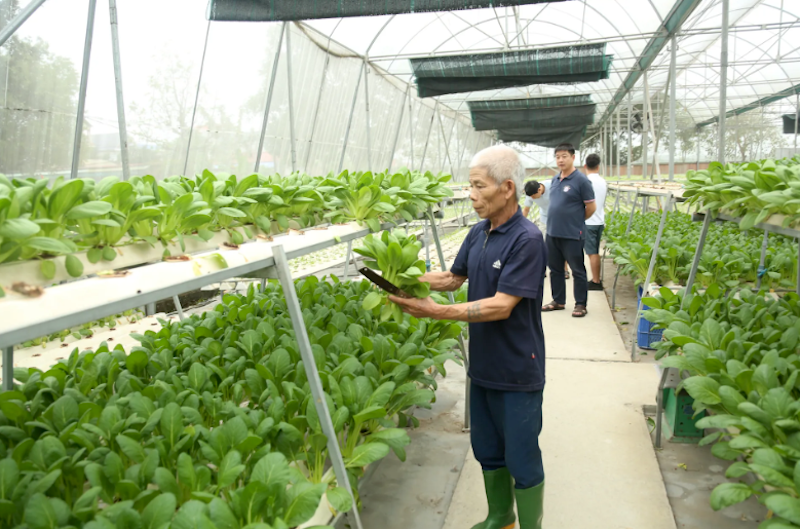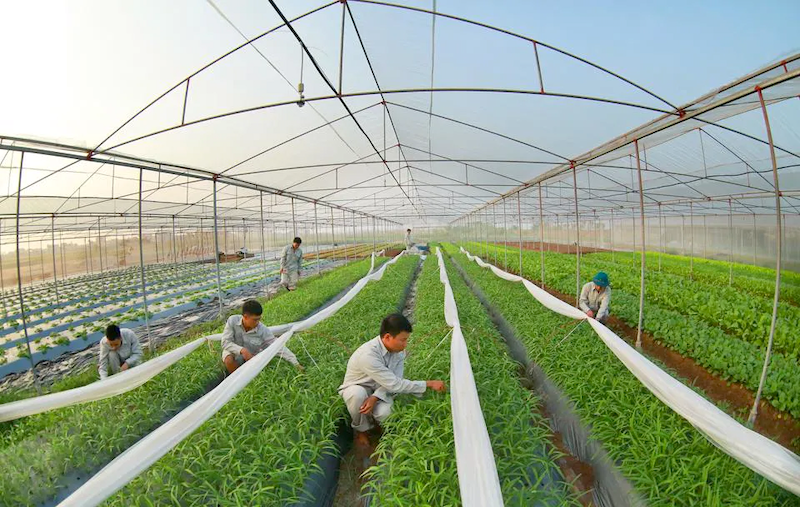Hanoi expands safe agricultural supply chains
Hanoi has established 170 food safety chains, spanning from production to consumption and engaging businesses, cooperatives, and farmers.
THE HANOI TIMES — Hanoi has developed production chains to establish safe agricultural zones, which have helped local farmers boost sales and gain market access. However, the transition from traditional farming to market-oriented agriculture is still facing significant obstacles.
According to the Hanoi Department of Agriculture and Environment, many farmers lack a commercial mindset, which limits their ability to adhere to contracts. This results in a low rate of agricultural output sold under formal contracts, and no strong supply chains needed for long-term market access.

High-tech vegetable farming in Phu Cuong Commune, Soc Son District, Hanoi. Photo: Pham Hung/The Hanoi Times
Meanwhile, in Soc Son District, safe agricultural production zones are beginning to emerge.
Hoang Thi Ha, Director of the Soc Son Agricultural Service Center, said the district has developed 180 hectares of safe tea, nearly 700 hectares of VietGAP-certified sticky rice, and 22 hectares of organic medicinal herbs, in addition to growing VietGAP pomelos, papayas, bananas, and super-sweet melons.
Currently, Soc Son District has 146 products certified under the One Commune, One Product (OCOP) program. Some products generating high economic value include golden flower tea, cordyceps, and handicrafts, while key supply chains are VietGAP sticky rice, Bac Son Commune’s safe tea, and Thu Thoan Cooperative’s probiotic chicken.
However, fragmented production and weak connections between farmers and enterprises continue to hinder the development of sustainable agricultural value chains.
Farmers rely heavily on traders to sell their crops, which leaves product prices and market access unstable. Meanwhile, high-quality agricultural goods have yet to achieve consistent branding, packaging standards, and traceability.
Dao Thi Luong shared this concern. She is the director of the Tam Anh Cooperative, which grows and sells safe fruits and vegetables, and runs an ecological village tourism program in Phu Xuyen District.
She said although her cooperative has partnered with various cooperatives to ensure stable supply and demand, small-scale and household-level farming make it difficult to control product quality and origin.
Expand safe food chains, seek investment

Clean production at the Japan & Vietnam Vegetable Fruit Company. Photo: Phuong Nga/The Hanoi Times
Nguyen Thi Thu Hang of the Hanoi Agro-Forestry and Fisheries Quality Management Sub-Department said that the links between businesses and producers are fragile, which undermines the sustainability of safe agricultural chains.
She added Hanoi has established 170 food safety chains, engaging businesses, cooperatives, and farmers from production to consumption.
The city is also supporting efforts to improve product quality and design while scaling up the impact of safe food supply chains.
It's necessary to encourage private investment in agriculture, especially in high-tech, organic, and clean food production, to maximize the effectiveness of safe agricultural value chains.
Localities need to support cooperatives and producers in adopting VietGAP, GlobalGAP, organic, and circular farming practices that align with market demand and food safety requirements.
Doan Duc Dan, Deputy Director of the Hanoi Agricultural Extension Center, said they collaborate with localities to implement the “Agri-extension and Production-Consumption Linkage” forum to help businesses and farmers in food safety and market connections.
It's also important to apply science and technology to household production, as well as building brand identities and traceability codes for potential export regions.
The Hanoi Department of Agriculture and Environment will continue working with localities to boost trade promotion, intellectual property protection, and the competitiveness of safe agricultural products.
It will also collaborate with relevant agencies to advise the city on developing commercial infrastructure and expanding digital platforms to enhance the branding and marketing of safe produce.












